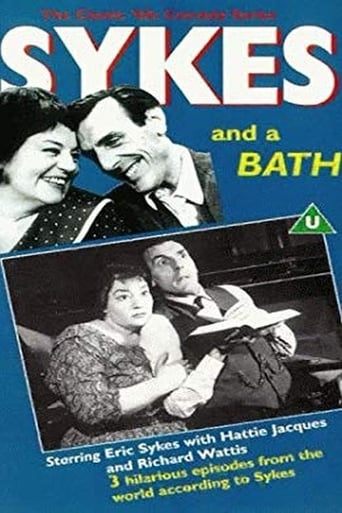RaspberryLucozade
This was our first sighting of Eric and Hat, that inseparable duo who lived at 24 Sebastopol Terrace. Initially the idea was to have them live as husband and wife but Sykes ( who wrote the series ) decided it would work better having them as brother and sister.Sykes' character, like Terry Scott in 'Happy Ever After' and its sequel 'Terry & June', was like that of an overgrown child. Hattie served not only as a sister to him but also a mother figure. She would belittle him whenever he messed things up but whenever anyone else did the same she would immediately jump to his defence.'Sykes & A' was named so to tie in with the suffixed episode titles ( such as 'Sykes & A Bath' ). Each week, Eric and Hat would embark on some new scheme or other, such as going sailing, getting a job as a bus crew, only for things not to go according to plan. Richard Wattis played their stuck-up neighbour Charles Fulbright Brown.'Sykes & A' is fondly remembered and even though much of it has dated it still has the power to amuse. It '70's revival, with the titled shortened simply to 'Sykes', breaks all conventions by being even better. Sykes suffered from profound deafness throughout most of his life though thankfully it had no bearing on his ability to act and write ( the horn-rimmed glasses he wore were actually a bone-conducting hearing aid ). Sadly, more than half of the episodes no longer exist in the BBC archives and what is even more sad is its lack of a DVD release. Three episodes were made available on VHS in the '90's but that's about it, which is a great shame.Overall, 'Sykes & A' was harmless fun and a DVD release, or even just a rerun on Sky, would be more than welcome.
screenman
Eric Sykes was a popular TV comedian when TV comedians were very much at a premium.He starred in the post-50's sit-com series 'Sykes And A ...' there being some new object or scenario with which he was implicated each week. Already in early middle-age, he played a stay-at-home bachelor living with his spinster sister; she played by voluptuous Hattie Jacques. Together they occupied what looked like a typical 1930's terrace or semi, in the what-had-been-in-their-day, the 'new' suburbs. Sykes and his sister represented the lower middle-class, which the BBC seemed to consider its principal audience.Beginning on the cusp of the 60's, the program was safe, sanitised and predictable. It was quite funny in its time, and as I say - popular. Contemporary competitors were 'The Charlie Drake Show' and 'Steptoe & Son'.Richard Wattis made cameo appearances as a snooty and intolerant neighbour - a typical junior civil-servant. The show ran its course and even staggered into the 1970's, by which time it was long since out of fashion. Charlie Drake never outlived the 1960's. 'Steptoe' on the other hand has proved itself to be a much-loved classic that has crossed generations and still appeals today. It was working-class, cruder and more irreverent.Sykes was a creature of his generation. He was a nice, unassuming, amiable bloke who could be funny. But he never had the stamp of a 'professional' funny-man - not in the way that Cooper, Morecambe & Wise, or Ronnies Barker & Corbett had. Perhaps that was his appeal. But it was date-stamped - 'Early 60's Comedian'.Today, he wouldn't get a look-in.
AntReid
OK, so I set your expectations too high and you won't agree with me. But I came in to this episode with no expectations at all and this was just brilliant. The basis of 'Sykes and a Bus' is that Eric is the driver and Hattie (his sister, of course) is the 'clippie' on a pre-Routemaster London Bus (the #136, as it happens). They aren't very good at it, and of course their unconventionality makes them a tremendous success and gets up the nose of... well the plots are all pretty much the all the same aren't they. It's the way the writers (Spike Milligan amongst others) set up the jokes and keep you guessing and smiling that is just art at work, a pure pleasure to watch. Hattie looks so young here (Hmm, Eric doesn't, but he must have been 40 I suppose, geez he's still in films at 80 though), and they both act so naturally in their parts, totally relaxed. Anyway - brilliant. Thanks BBC 4 for rolling out your archive!

